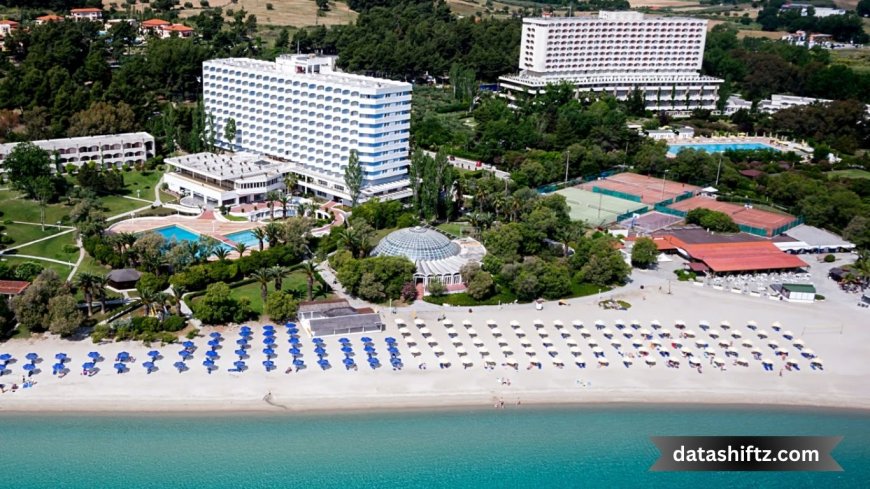Goldman Sachs Exits Greek Hotel Market Amid Setbacks

In a startling turn of events in global real estate investment, Goldman Sachs has officially abandoned its ambitious hospitality venture in Greece. The decision, finalized June 29, 2025, brings an unexpected end to the bank’s €100 million investment in developing a boutique hotel portfolio on the Halkidiki peninsula.
A Bold Start: Goldman’s Mediterranean Ambition
Just three years ago, Goldman Sachs launched what seemed to be a promising strategic pivot. Identifying the surging tourism boom across Greece and the Aegean Sea’s less-trodden mainland, the firm created a boutique hotel brand under a newly-formed platform called Ousia—Greek for “substance.” They acquired three seafront resorts in Halkidiki—Athos Palace, Pallini Beach, and Theophano Imperial—with groundbreaking plans to fully renovate, consolidate, and rebrand them by 2025. Initial investment hovered around €100–108 million, with total projected spending between €150–200 million.
Goldman’s goal was twofold:
-
Generate long-term returns through real estate value appreciation.
-
Earn management fees via hospitality operations under “Ousia.”
The plan seemed well-aligned with post-pandemic tourism trends and growing investor appetite in Greece.
The Underlying Challenges
However, Goldman’s rapid ascent ran into structural obstacles often faced in large-scale real estate ventures:
-
Permits and Regulatory Delays
Despite Investment Committee approval, the firm faced bureaucratic hurdles. Obtaining construction, demolition, and renovation permits took far longer than expected. -
Rising Cost Pressures
Construction material and labor inflation significantly increased project expenditure. Initial forecasts expanded from €150 million to potentially double that amount. -
Operational Inexperience
Rather than partnering with a seasoned local operator, Goldman chose an internal team to oversee development. Their limited familiarity with Greek building logistics and supply chains compounded delays & cost overages. -
Staffing Adjustments
At its zenith, Ousia employed about 10 Athens-based staff. However, as the project stagnated, some were let go and management realigned.
The Turning Point: Exit and Sale
After struggling with delays and diminishing returns, Goldman decided in spring 2025 to exit the venture put the hotels up for sale. In an abrupt divestment, they sold the properties to Sani/Ikos Group—a firm recognized for its Mediterranean luxury resorts. Goldman reported barely breaking even on the €100 million invested.
Goldman officially exited direct hotel investments in Greece, though it retains a minority interest in Prodea, a real estate company, and continues to operate its investment banking and asset management activities in the country.
Comparative Snapshot of Investments
| Aspect | Goldman Sachs | Sani/Ikos Group |
|---|---|---|
| Acquisition | 3 Halkidiki resorts (€100–108 M) | Purchased from Goldman, spring 2025 |
| Planned Investment | €150–200 M renovation cost | €400 M redevelopment plan |
| Operations Platform | Ousia (new, untested) | Established Sani/Ikos luxury brand |
| Opening Target | 2025 | 2029 |
| Scale & Amenities | Unclear combined positioning | 750 rooms, 30+ restaurants, pools, spa |
| Outcome | Abandoned, sold break-even | Major reinvestment and growth |
Takeaways: What This Exit Means
-
Local Expertise Matters
Even juggernaut investors like Goldman can falter without seasoned local partners. Greece’s redevelopment challenge highlights the importance of domain expertise in hospitality. -
Cost & Timing Are Critical
Projects of this scale are vulnerable to inflation, permit delays, and on-site complexities. These left Goldman with slim margins. -
Strategic Reallocation of Capital
Goldman shifted focus back to its core strengths—investment banking and asset management—while Sani/Ikos is doubling down on hospitality, pledging €400 million to convert the sites into the “Ikos Kassandra” luxury resort. -
Macro-Industry Implication
The move underscores a broader trend—massive, ambitious real estate projects increasingly favor operators with proven track records and on-ground networks.
The Path Ahead: Sani/Ikos and Beyond
For Sani/Ikos Group, acquiring these Halkidiki properties reinforces its Mediterranean expansion. The planned Ikos Kassandra, featuring nearly 750 rooms, multiple pools, over 30 restaurants/bars, theaters, and spas, is scheduled to open in April 2029, becoming the brand’s biggest resort yet.
As the hospitality competitive landscape shifts post-COVID, firms like Sani/Ikos are betting on all-inclusive luxury with demonstrated operational success. Meanwhile, institutional capital is becoming more selective—Goldman’s retreat sends a cautionary signal: even well-funded investments can struggle without local insights and robust execution.
Final Reflections
-
For Real‑Estate Investors: Due diligence must pay close attention to regulatory environments, cost volatility, and operator experience.
-
For Greece’s Tourism Sector: The rise of a mega-resort like Ikos Kassandra promises jobs, infrastructure, and luxury brand visibility.
-
For Asset Managers: Goldman’s exit illustrates the strategic importance of shedding underperforming assets to refocus capital and preserve returns.
Goldman Sachs’s foray into Greek hospitality may have ended prematurely, but it offers a compelling case study in the perils of ambitious cross-border real estate ventures. As Sani/Ikos charts a new path forward, Greece’s tourism tapestry enters a high-stakes era—where local knowledge, execution prowess, and brand resonance will determine winners.





























